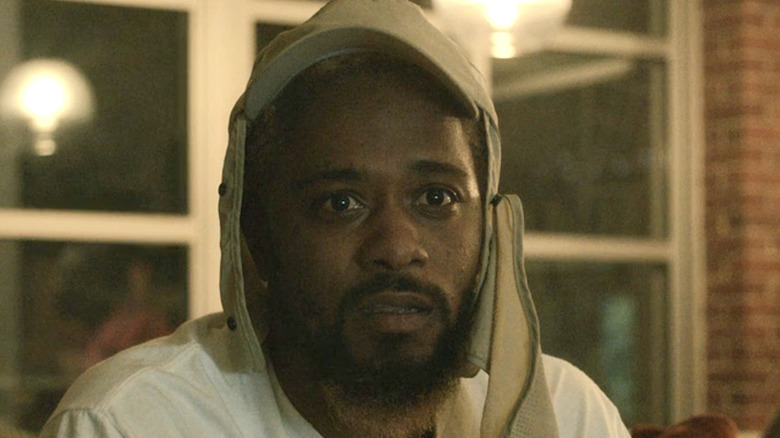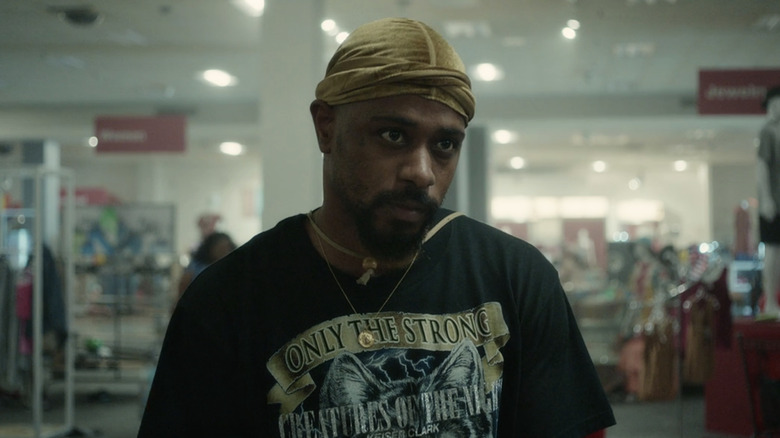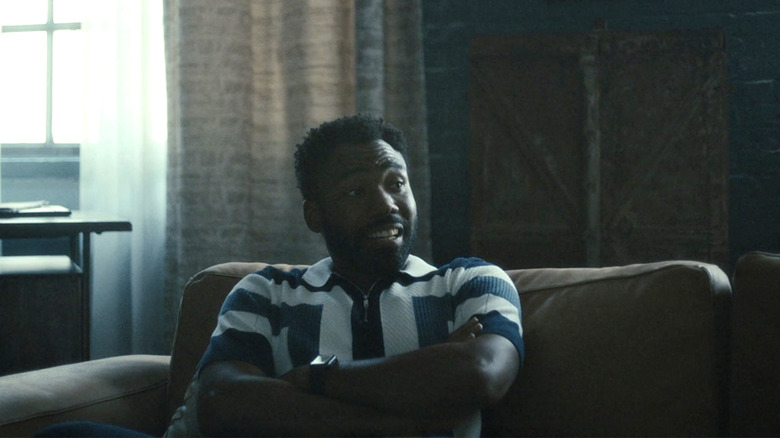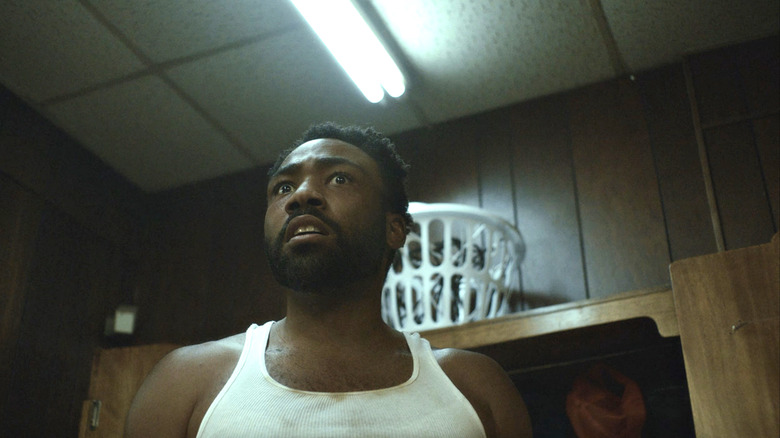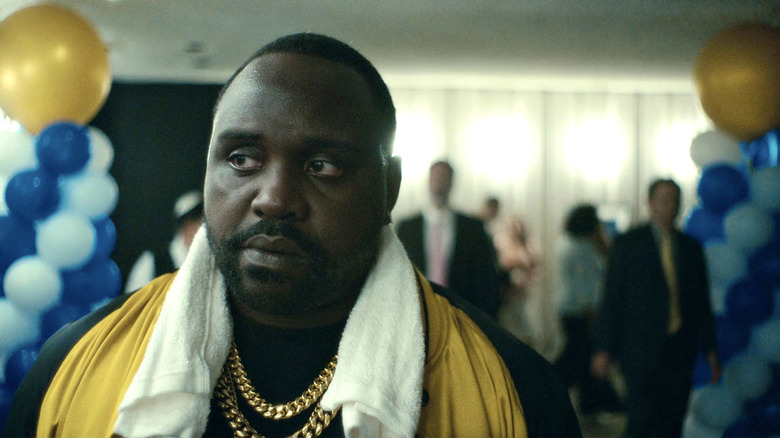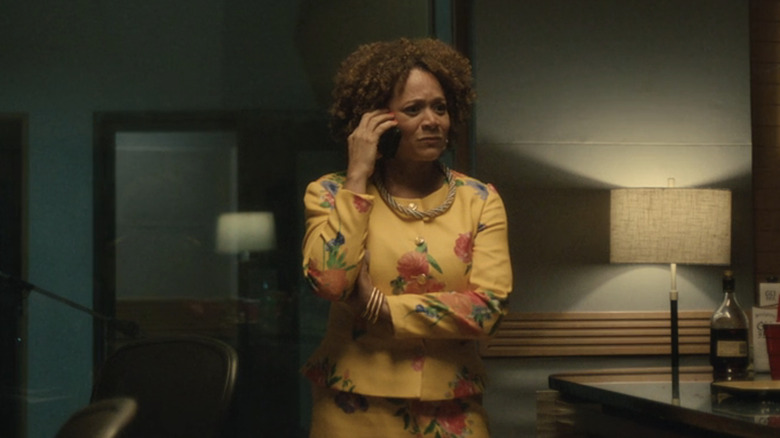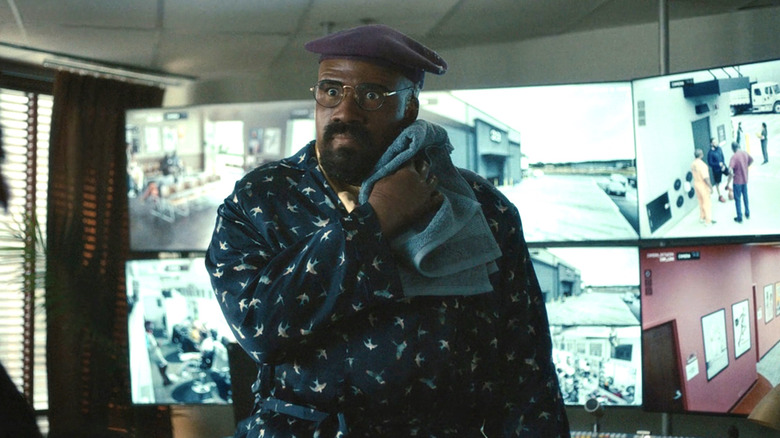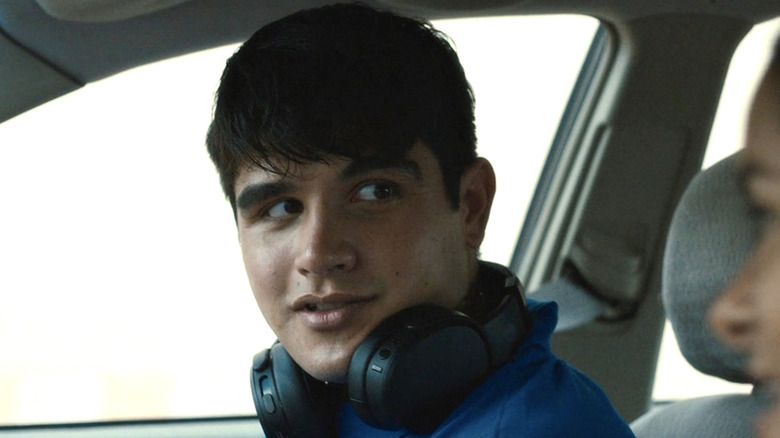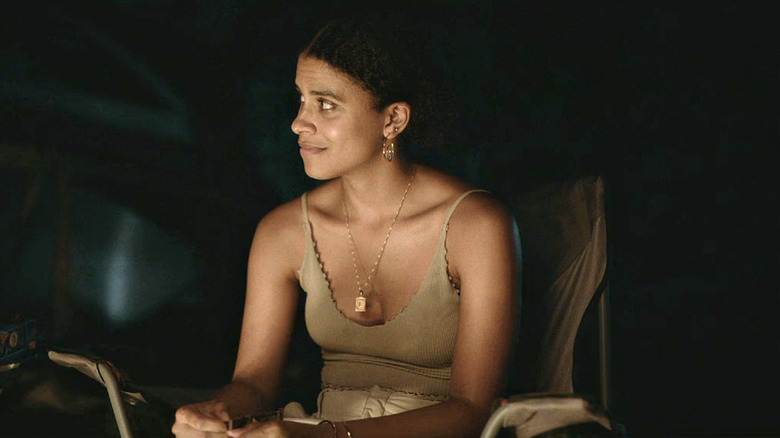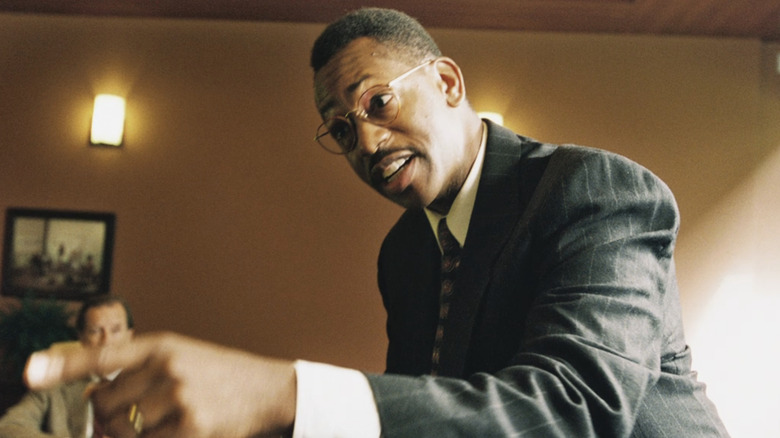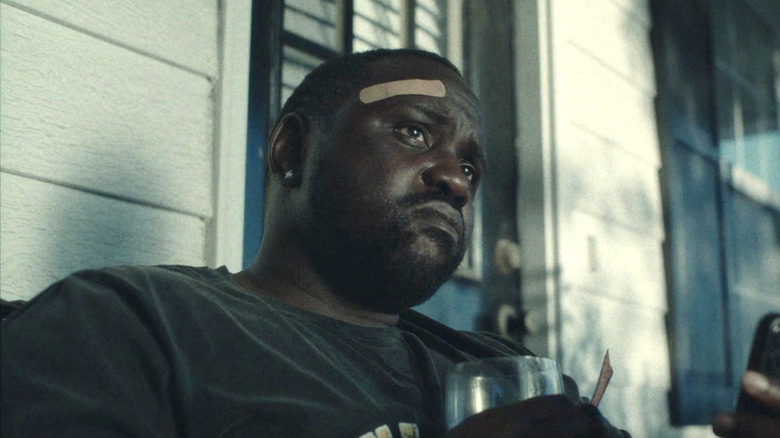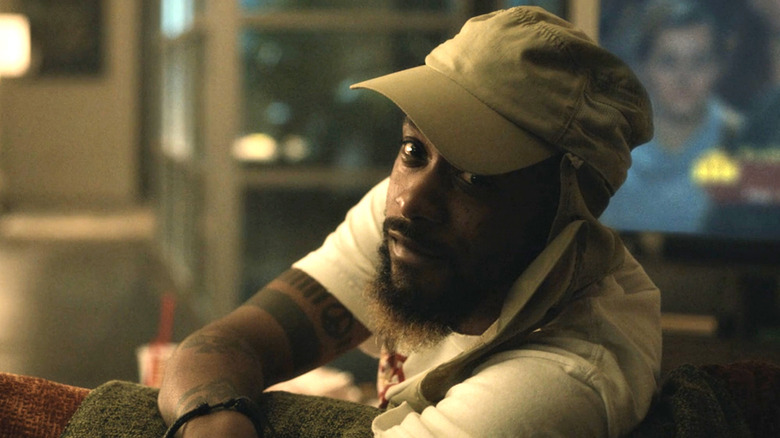Biggest Unanswered Questions From Atlanta Season 4
After four seasons across six years, Donald Glover's surreal FX comedy "Atlanta" came to an end in November 2022 in typically mysterious, haunting fashion. Half-jokingly promoted by Glover as "'Twin Peaks' with rappers" when the first season aired in 2016, the show's straightforward premise — Ivy League dropout Earn (Glover) attempts to manage his cousin Alfred's (Brian Tyree Henry) burgeoning rap career — was marked with dreamlike flourishes and a deadpan outlook on Black life in the 21st century, where, as series director Hiro Murai put it in a 2022 interview, "you can't tell if a joke is coming or some horrendous act of violence." After two acclaimed seasons the show went on an extended, four-year hiatus, then aired Seasons 3 and 4 back-to-back in spring and fall 2022.
Season 3 took the show's central quartet — Earn, Alfred, Earn's sometime-partner Van (Zazie Beetz), and stoner philosopher Darius (LaKeith Stanfield) — on an alienating tour of Europe, while Season 4 showed that things weren't much different for them back at home. Questions of legacy and remembrance are key to the season, but the finale offers up few answers as to what the future might hold, content to give us a final disorienting adventure from the same minds that brought Black Justin Bieber, Teddy Perkins, and the invisible car to life. Let's take a look at some of the most pressing unanswered questions from the final season of "Atlanta."
What caused the riot at the department store?
While Earn and the gang were in Europe, Season 3 checked in on the United States with several standalone "anthology" episodes featuring new characters and storylines that revolved around the series' central themes. Season 4 mostly eschews this format — with one notable exception toward the end of the season — but feints at it in the first two episodes. Episode 1, "The Most Atlanta," lives up to its title not just by taking us through all corners of the eponymous city, but also by sending its four characters off on their own scary-funny, funny-scary adventures. It's the most Atlanta, but also the most "Atlanta."
The episode throws us straight into the action, via a big box department store that is in the throes of a riot. As looters grab everything they can and employees cower in fear, this could very well be the start of another anthology episode ... until Darius, minding his own business, shows up at customer service to return an air fryer he received as a gift. Unable to return the fryer (which he doesn't have a receipt for and may not have been purchased at this store), Darius tries to leave, but an older white lady on a motorized scooter blocks his way, mistaking him for a looter. Darius walks around her, but she pursues him, slowly but surely like the killer in a slasher movie, for the rest of the episode. The cause of the riot is never given, but more chillingly, it's never clear whether the woman chasing Darius is an employee, or just a bystander who appointed herself store security.
Did Earn go back to therapy?
Episode 2, "The Homeliest Little Horse," operates for most of its running time on two tracks. On one, Earn has several sessions with his therapist (Sullivan Jones) where he talks about his new job at a major PR firm, the possibility of moving to Los Angeles for work and what that would mean for Van and their daughter Lottie, and for the first time in the series, the specific reason he left Princeton before graduating: A racialized incident involving a borrowed suit and a young white woman he thought he was friends with. Earn is guarded in therapy, but willing to talk, and seemingly willing to put in the work to improve himself, right up to the moment when he quits.
Earn is a more active character in a different way as well. The episode's second track feels like an anthology story, as a woman named Lisa (Brooke Bloom) receives an email from a literary agent wishing to represent her and her unpublished children's book "The Homeliest Little Horse." The agent's enthusiasm for the book and her own excitement causes her to quit her day job and spend a fortune on her clothes and hair, but when a disastrous reading at a local library humiliates her, the episode's two tracks converge: This was all an elaborate revenge plot by Earn after Lisa caused him to miss an important flight. At the plot's "cast party," even Al and Darius are alarmed at the lengths Earn pursued to serve payback on this stranger. Earn sits alone at the bar and wonders aloud if he should go back to therapy; the answer is clearly yes, but we'll never know if he followed through on that moment or not.
Were the Season 3 anthology episodes real?
The Season 3 anthology episodes are introduced appropriately enough, with a dream within a dream. Two men, one white and one Black, fish at night or early morning on a reservoir. The white man (Tobias Segal), whose name is also Earn Marks, tells a story about the Black town that was flooded to create the reservoir, before turning monstrous as a score of ghostly Black hands pull his fishing buddy into the water. White Earn will return a few more times in that season, most notably in "The Big Payback," the anthology episode that imagines an America transformed by reparations.
None of this has much to do with our Earn until an end credits scene at the end of Season 3 when he receives White Earn's luggage by mistake. Then, in the Season 4 episode "Born 2 Die," Earn's quixotic mission to recruit R&B singer D'Angelo for a PR campaign ends with a man (Enoch King) who is definitely not D'Angelo, but who somehow knows intimate details about Earn's life — including the nightmare involving White Earn on the reservoir that opened Season 3. So what are we to make of these anthology episodes? Were they "real," to the extent that anything can be real in the "Atlanta" universe? Most of them were self-contained short stories, though "The Big Payback" depicts a monumental societal shift in America that Season 4 has no evidence of. Can an event, several events, or even an entire series of television be real and not real at the same time? Darius would probably say yes.
What happened to Alfred's career?
One of the most interesting things about "Atlanta" is how it keeps what would be major moments on any other series out of sight, happening in between seasons or even in between episodes. The arc of Alfred's rap career is the clearest example of this. In Season 1 he's a local rapper with a limited amount of radio play, but becoming more well known in the scene — well known enough to play in a charity basketball game with Justin Bieber and appear on a Black America Network panel show. By Season 2, he's popular enough to play college gigs out of town and open on the European tour of a more famous artist.
It's unclear how much time passes in the show between Seasons 2 and 3, if it's four years as in real life, but by now Alfred (aka Paper Boi) is headlining his own European tour, with all the wealth and privilege that would imply; Earn is working constantly as his ultra-competent manager — a far cry from their unsure partnership from the first two seasons. But by Season 4 Alfred seems to already be on the back slope of his career, seeing peers and influences die off and popular tastes drift to dorky white teen rappers, as seen in "Born 2 Die." He's never been particularly interested in the trappings of fame, or even working on his music all that much, seeing them instead as a means to an end. But after riding high in Season 3, in Season 4 that end appears to be in sight.
Will Earn end up like his family?
Earn's parents Gloria and Raleigh (Myra Lucretia Taylor and Isaiah Whitlock Jr.) appear in the first season, and we meet Earn and Alfred's uncle Willy (Katt Williams) in Season 2's "Florida Man," but otherwise the show doesn't dwell very much on where the cousins came from, or the family lives of Van and Darius. But the episode "Light Skinned-Ed" focuses on the home where Earn grew up, and the way that the past for them has never truly passed. Chaperoning his mother, grandfather (Bob Banks), and Aunt Jeanie (Michole Briana White) to church one Sunday, Earn is thrust into ongoing family drama in which the egotistical Jeanie is convinced that Gloria is trying to kidnap their father, who suffers from dementia, to the point of calling the police when Gloria and Grandpa leave service early.
For Jeanie, the issue stems from the fact that her siblings resent her for being more attractive and light-skinned. Earn's Aunt Pearl (Teresa L. Graves), on a conference call with Jeanie, Willy, and Gloria, clarifies that they don't like her because she's evil. For Earn, it's all too exhausting, and in a rare bit of candor, he tells Alfred that he doesn't want the two of them to get like that when they are older. But does he have any other choice? He and Alfred are on good terms in this season, but they haven't always been, and if they are no longer business partners in the future, they could very well grow distant — or worse, grow into the kind of decades-long rancor that their aunts and uncle have.
What happens to Kirkwood Chocolate?
One of the most famous episodes of "Atlanta" is Season 2's "Teddy Perkins," a harrowing descent into madness centered around the title character, who Glover plays under loads of prosthetics like a cross between Michael Jackson and Howard Hughes. The character was so jarring that Glover (or someone else) dressed as Perkins at the 2019 Emmys. Season 4 saw a sequel of sorts to that episode with "Work Ethic!" which takes direct satirical aim at the Tyler Perry entertainment empire. When Van books a small acting role on one of the many shows produced by mogul Kirkwood Chocolate, she takes Lottie to the studio with her. But soon Kirkwood, an all-knowing voice booming from the studio intercom, takes an interest in Lottie and whisks her away to be the star of any number of shows in simultaneous production.
Once again played by Glover under heavy makeup, Kirkwood is not nearly as disturbing a creation as Teddy Perkins, but he's also a direct parody of Perry, a paranoid control freak who has remade Atlanta in his own image. He repackages Black culture and sells it back as stereotypical pap (a charge also leveled at Popeyes Chicken in the finale), but before "Atlanta" gets too high and mighty about its crosstown rival, Kirkwood points out that Van, a light-skinned working single mom with a (in his words) dark-skinned baby daddy, is not so different from the heroines of his hacky sitcoms. Van responds by throwing a pot of hot grits in his face and fleeing with Lottie. But where Teddy Perkins' episode had a definitive end for the troubled man, Kirkwood Chocolate appears to survives Van's attack, free to keep ruling his television kingdom forever.
Does Roberto keep pursuing his rap career after the mall shooting?
In a small vignette in the episode "Crank Dat Killer," Roberto (Adrian Mauro) sits in the car with his wife Veronica (Yanelisa) before his shift at the mall begins. Their young daughter is in the backseat. Veronica gently broaches the subject of Roberto's would-be rap career, about how it might be good to have a fallback career in case musical stardom never happens for him. Roberto tells her that he just needs an opportunity, like when Big Sean rapped for Kanye outside a Detroit radio station and got signed. Roberto is putting his family's future on the line with no plan other than blind luck; fortune seems to smile on the young man, however, when he clocks in at work and is told that Paper Boi was spotted at the mall.
But this is Atlanta, and this is "Atlanta," which means that there is a killer on the loose hunting people who posted videos of themselves doing Soulja Boy's viral "Crank Dat" dance in the late 2000s — of which Alfred is one. Racked with paranoia, Alfred looks over his shoulder as a man he saw coming in pulls out a gun and starts shooting. Alfred runs in a panic as fire is returned by any number of "good guys with guns," and when Roberto takes his shot (so to speak) and tries to rap for Alfred, he gets pushed through a plate glass window — his dreams of stardom literally shattered. Is this the push (so to speak) he needs to take his wife's advice and leave the rap game behind? We will never know.
Will Van and Lottie go with Earn to Los Angeles?
Things don't always turn out well when "Atlanta" characters leave the city for the woods. There's a primal discomfort to the rural space just outside of the metro area, an inexperience that quickly morphs into danger (as we will see again in a future episode). But in "Snipe Hunt," Earn braves the elements to take Van and Lottie on a weekend camping trip. Ostensibly the trip is to celebrate Lottie's sixth birthday, but really Earn has bought them out to ask if they'll come to Los Angeles with him. As he noted to his therapist in "The Homeliest Little Horse," he has a job waiting for him on the coast, but he can't bear the thought of leaving Lottie and Van behind.
It's the "and Van" part that is the most challenging. Van won't go if Earn just sees her as a co-parent or a friend with benefits or whatever different permutations of partner she has been to him over the years. "I still desire you," he tells her late at night in the tent as Lottie sleeps nearby. "And the fact that you are also the mother of my child? I could just f***ing burst." The night ends with a quiet but loving "okay" from Van. She has agreed to move the family to Los Angeles, but we never actually see this move happen. The season (and series) ends with everyone still firmly in the ATL, and with no other mention of Earn's impending relocation. Does it ever happen? And if so, does Van stay firm in her commitment to Earn, or does life, as it often has for these two, get in the way?
What really happened to Disney CEO Tom Washington?
The show revives its anthology format just once in Season 4, for the mockumentary "The Goof Who Sat by the Door." Taking its title from Sam Greenlee's classic 1968 novel, the episode is presented as a talking-head-style documentary airing on Black America Network about Tom Washington (Eric Berryman), an animator in the early 1990s who, due to a voting error, found himself briefly the CEO of the Walt Disney Company. Given the keys to the mouse kingdom, Washington sets out to develop what he hopes to be the Blackest film of all time: "A Goofy Movie." But the pressure on him as the first (and only) African American head of Disney proves to be too great, and in trying to make a film that captures the Black experience and honors his late father, Washington cracks under the pressure.
The idea that "A Goofy Movie" is coded as Black is not original to Glover or "Atlanta." Plenty has already been written about it over the last few years, as '90s kids have grown up to reclaim and reevaluate the pop culture of their youth. Tom Washington has no clear connection to any of the main "Atlanta" cast, but his struggle as a Black creator, trying to cement a legacy as quickly as possible before the chance evaporates, is echoed in Alfred's journey this season. Washington's car is found in the water near Disney's studios, along with some of his effects (like a giant Goofy shoe), but his body was never recovered. Was his death self-inflicted? Was it an accident or intentional? Was it even a death at all? The final episodes of the series provide no answers, and no other hints.
Does Alfred keep his safe farm?
In the midst of the panic surrounding the "Crank Dat Killer," Alfred puts in a call to the man himself, Soulja Boy, who tells Alfred he's heading out to his "safe farm," a country home where he can go when the heat of the city gets too real. Alfred doesn't have a safe farm, hasn't even thought to get one, but he takes Soulja Boy's advice in the penultimate episode "Andrew Wyeth, Alfred's World." The title is both a riff on Andrew Wyeth's famous 1948 painting "Christina's World," as well as a foreshadowing of where Alfred will end up.
Just as Earn broke the curse of the "Atlanta" woods in "Snipe Hunt," Alfred seems to be doing just fine on his safe farm. He watches online clips of how to repair a tractor engine and takes his new toy on a joyride, but when the ground gives underneath them, the tractor rolls over and catches his ankle. As if it weren't enough to drag himself home through the grass with a bloody foot, he then fends off the feral hogs who have taken an interest in his grow house. At first it seems like the kind of traumatic night that would send him back to the city, but by morning light he has iced his ankle and bandaged his wounds, sipping whiskey while FaceTiming with Earn. Alfred will be back in the city for the final episode, so perhaps he was just putting on a brave face for Earn and sold the farm the next day, but maybe not.
Was this all Darius' dream?
Darius takes a back seat for much of the second half of Season 4, not appearing at all in the three episodes leading up to the series conclusion, but he takes center stage in the finale, appropriately titled "It Was All a Dream." The episode plays like a classic "Atlanta" format, with the quartet breaking off into two or more groups where one group has a racially charged social interaction, while the other group has a more esoteric experience that informs the themes of the episodes. On the social front, Alfred, Earn, and Van journey to Atlanta's only Black-owned sushi restaurant where the service is bad, the food is worse, and a Popeyes Chicken sits just across the street. Meanwhile, Darius is trying to get to his appointment at a sensory deprivation chamber (AKA his "depp sesh"), where his intense visions blur the line between dreams and reality.
So ... what was all a dream? Darius' adventures in sensory deprivation? The entire season? The entire series? None of these are entirely off the table. The episode plays by "Inception" rules, where Darius' totem is "thicc Judge Judy"; if the famous TV judge appears unusually well-endowed, he knows he's still dreaming. And when he steals a pink Maserati and rescues his friends from the sushi restaurant, he only does so because he thinks he's still dreaming. In fact, Earl, Van, and Alfred may all simply exist in his dream — a thought that freaks Alfred out so much that he has to smoke weed out on the porch. As Earn and Van join him, Darius watches TV. "Judge Judy" is on. Is she thicc? Darius sees for sure, but we don't.
